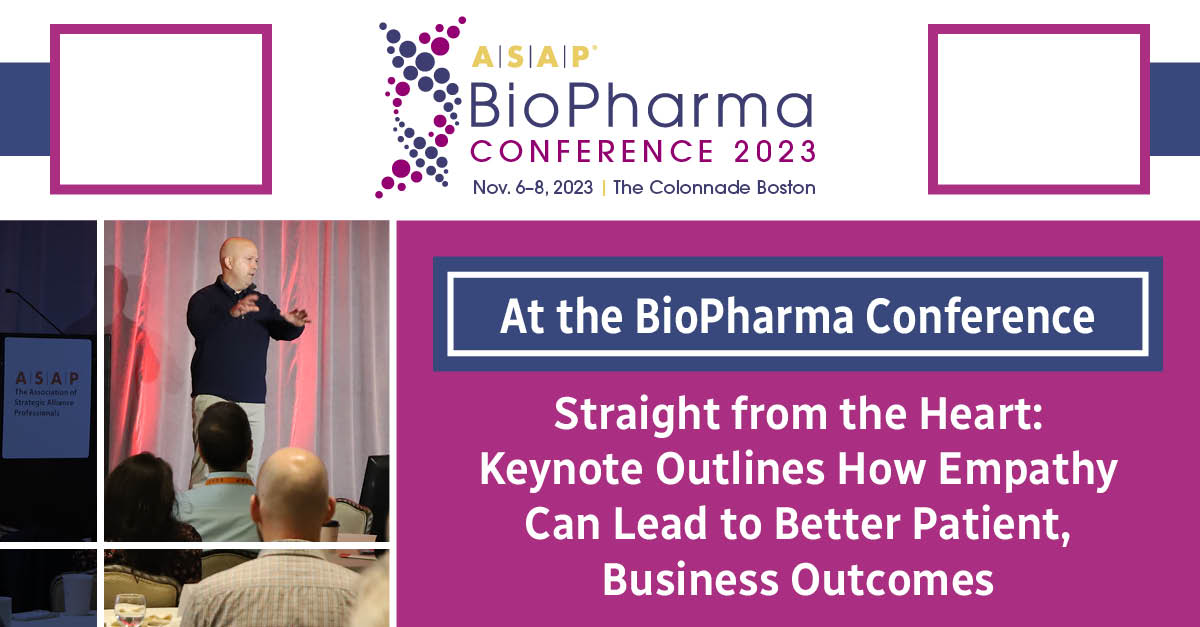Straight from the Heart: How Empathy Can Lead to Better Patient, Business Outcomes
In 2018, Doug Wenners, CEO of Element3 Health, watched his father, his hero, battle chronic lymphocytic leukemia (CLL). Despite having access to some of the most respected doctors in New England, he endured several complications and comorbidities—lung infections and pneumonia, among them—along the way that forced him to make 20 trips to the hospital over the course of the next three years.
“When my dad was experiencing his personal struggle with cancer, and I had the opportunity to see how the healthcare system, as great as it was, really fail him, I wanted to do something about it,” Wenner recalled as he opened his keynote address at the 2023 ASAP BioPharma Conference, “Be the Change: How Great Leaders Bridge the Science-to-Patient-Care Gap.”
The story of his father’s struggles set the stage for several more anecdotes about Wenners’s life and career that revolved around a particular premise: empathy can help simultaneously improve peoples’ lives and deliver powerful business outcomes.
A Business Built to Serve—and Be Sold
Early in his presentation, Wenners asked conference attendees to reflect on a close friend’s or relative’s struggle with a major health ailment and ponder the question “If you had a magic wand, what would be the one thing that you would do to make the experience your loved one had better in the moment?”
For Wenners, the answer was to launch Prospero Health, a homecare medical company that serves the elderly. The company puts together preventative care plans and assembles a team of nurses, doctors, social workers, and others to carry them out by proactively managing medical and social issues that affect patients’ overall wellbeing. Through this work, Prospero Health has lowered the overall cost of care for its patients by 25 to 30 percent.
“It turns out that more care isn’t better care,” said Wenners.
However, there was a more important lesson in this story, and one that turns out to be a common thread throughout Wenners’s career before and after he founded and sold Prospero Health to United Healthcare.
“The entire mission of the company was built around serving other people,” he said. “There’s something about submitting to the service of other people—where you fully submit—that is just incredibly rewarding.”
Wenners decided, “Great businesses can be built on the back of just empathy.”
You Have to See a Problem to Solve It
Looking back on it, Wenners realized that this lesson could have served him better when he was working in the insurance industry administering plans from Anthem Blue Cross and Blue Shield. He told a story about a doctor who summoned him to a meeting with 25 other physicians in order to hear a sternly worded message that the managed care industry was failing the people who treated patients. Wenners was warned that decreasing pay and increasing administrative burdens would result in fewer medical school graduates choosing to be primary care physicians. Anger and defensiveness prevented Wenners from hearing the message that day.
Fast forward 10 years when Wenners was involved in implementing Anthem’s new value-based care platform that aimed to foster collaboration around the shared goal of delivering quality care to patients. Wenners reviewed the industry’s main business problems, and sure enough, he found that Americans had less access to primary care physicians and people coming out of medical school were eschewing the profession. Anthem would go on to invest $1 billion into a network of thousands of primary care physicians across 14 states.
“If I had listened to what was being said to me 10 years earlier, there was an opportunity to have intervened and done something earlier about a problem that was very evident had I just been willing to see it,” said Wenners.
Filling a Major Healthcare Need Is a Great Reason to Live
Wenners’s current venture is built on the idea that small miracles can be delivered by solving obvious problems staring us in the face as a society. Element3 Health helps build social connections for elderly people who might be susceptible to isolation (e.g., friends have passed away, children have moved abroad, etc.). The company works with grassroots organizations to provide bowling leagues, pickleball tournaments, quilting guilds, and other activities and collaborates with the managed care industry to fund them.
Wenners noted that mothers who undergo breast cancer treatment have significantly higher five-year survival rates than childless female adults. He also harkened to Victor Frankl’s book “Man’s Search for Meaning,” a holocaust survivor’s tale. The main takeaway from these two data sources applies to Element3 Health’s purpose: people with a reason to live do just that—live.
“We know when communities are strong—you have individual connections with people, you have a reason to live—you live longer, you live better,” said Wenners. “You have to be willing to see those opportunities that are obvious if you’re paying attention, and then care enough to do something about it so that you can help people.”
Alliance Managers Are Everyday People
Wenners closed with a story about a firefighter who rescued a pregnant mother of three children. Seeing that the kids were frightened in the moment, the firefighter prepared their preferred cinnamon toast breakfast, helped them pack their bags for school, and waited for their dad to get home. As Wenners was telling this story, a slide behind him displayed the quote, “I’m really trying to instill this belief that you should always be compassionate when doing your job.”
How does this advice apply to life sciences alliance managers? Wenners urged listeners to ask themselves, “What can I do to actually solve the problems I know [of]? These problems are hiding in plain sight.”
Everyone in the medical ecosystem—pharmaceutical companies, managed care providers, health tech companies, and the like—still has room to improve when it comes to being patient-centric, despite the omnipresent rhetoric around the industry about putting patients first.
“[We] can do a much bigger, better, bolder job at being focused on everyday people,” he said.

